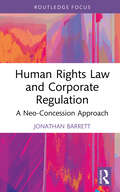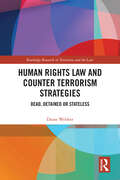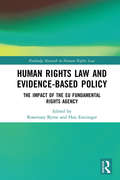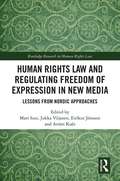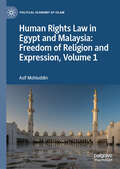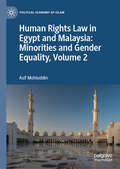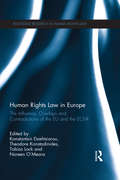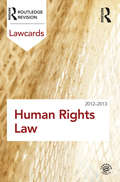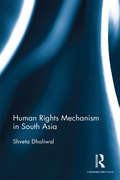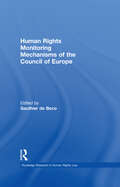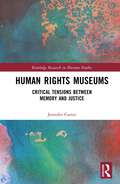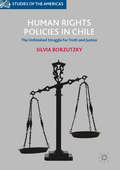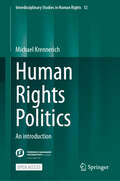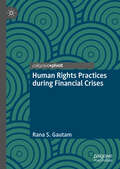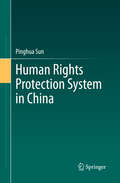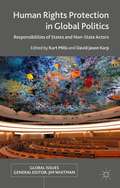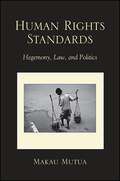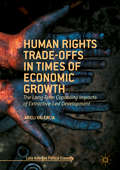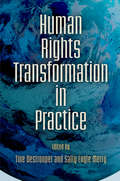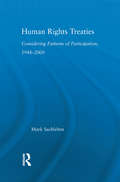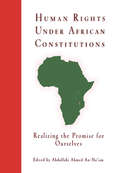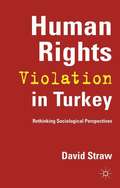- Table View
- List View
Human Rights Law and Corporate Regulation: A Neo-Concession Approach (Routledge Research in Human Rights Law)
by Jonathan BarrettThis book argues for an intensely humanist engagement with the company and presents a model of company regulation that is compatible with the protection, respect for and fulfilment of human rights.Dr Barrett provides a theoretical framing for corporate regulation in the context of human rights States. He argues that States which have ratified the fundamental human rights instruments should, on principle, exclude bodies corporate from the human rights ecosystem, except to the degree necessary to respect property rights of humans and human rights in business. He therefore develops a ‘neo-concession’ account of the corporation as the basis for a model of corporate regulation to protect human rights. The book outlines and recommends the principal features of a company under a neo-concession model, and the role of regulators in furthering the State’s human right obligations. It also delves into the potential issues of technological developments, including decentralised autonomous organisations, and the lessons policymakers can gain from First Nations’ approaches to business.This is a thought-provoking volume that will appeal to scholars in the disciplines of human rights law and corporate governance, as well as policymakers and regulators interested in regulating business for greater societal good.
Human Rights Law and Counter Terrorism Strategies: Dead, Detained or Stateless (Routledge Research in Terrorism and the Law)
by Diane WebberIn 2006, the United Nations urged Member States to ensure that counter terrorism policies guaranteed respect for human rights and the rule of law. This book demonstrates that, in many cases, counter terrorism policies relating to preventive detention, targeted killing and measures relating to returning foreign terrorist fighters have failed to respect human rights, and this encourages vulnerable people to be drawn towards supporting or committing acts of terrorism. Furthermore, in recent years, jurisprudence and public opinion in some countries have shifted from being at one stage more protective of human rights, to an acquiescence that some particularly draconian counter terrorism methods are necessary and acceptable. This book analyzes why this has happened, with a focus on the United States, United Kingdom, and Israel, and offers suggestions to address this issue. The work will be essential reading for students, academics and policy-makers working in the areas of human rights, humanitarian law, and counter terrorism.
Human Rights Law and Evidence-Based Policy: The Role of the EU Fundamental Rights Agency (Routledge Research in Human Rights Law)
by Han Entzinger Rosemary ByrneThe EU Fundamental Rights Agency (FRA) was established to provide evidence-based policy advice to EU institutions and Member States. By blending social science research with traditional normative work, it aims to influence human rights policy processes through new ways of framing empirical realities. The contributors to this volume critically examine the experience of the Agency in its first decade, exploring FRA’s historical, political and legal foundations and its evolving record across major strands of EU fundamental rights. Central themes arising from these chapters include consideration of how the Agency manages the tension between a mandate to advise and the more traditional approach of human rights bodies to ‘monitor’, and how its research impacts the delicate equilibrium between these two contesting roles. FRA's experience as the first ‘embedded’ human rights agency is also highlighted, suggesting a role for alternative and less oppositional orientations for human rights research. While authors observe the benefits of the technocratic approach to human rights research that is a hallmark of FRA’s evidence-based policy advice, they also note its constraints. FRA’s policy work requires a continued awareness of political realities in Brussels, Member States, and civil society. Consequently, the complex process of determining the Agency’s research agenda reflects the strategic priorities of key actors. This is an important factor in the Agency’s role in the EU human rights landscape. This pioneering position of the Agency should invite reflection on new forms of institutionalized human rights research for the future.
Human Rights Law and Regulating Freedom of Expression in New Media: Lessons from Nordic Approaches (Routledge Research in Human Rights Law)
by Mart Susi Jukka Viljanen Eiríkur Jónsson Artūrs KučsThe Nordic countries are well known globally for their high human rights standards and, at the same time, high degree of internet freedom. This edited collection reveals how the Nordic countries have succeeded in the task of protecting freedom of expression in the new media. It contains an overview of public policy choices and best practices of domestic online companies, which have the aspiration of finding global acceptance. Reviewing the topic of freedom of expression in new media within Nordic and Baltic countries, this book incorporates both general themes and interesting country-specific themes that will provide wider knowledge on the development of freedom of expression and media law in the online media era. A comprehensive analysis of regulation of online media, both at the level of legislation and application of law in courts and other authorities, are included. This book will contribute to the ongoing discussion as to whether there is a need to modify prevailing interpretation of freedom of expression. Human Rights Law and Regulating Freedom of Expression in New Media focuses on the multi-layered and complicated relationship between internet and human rights law. It contributes to the ongoing discussion regarding the protection of freedom of expression on the internet in the context of various doctrines of constitutional law, including the proliferation of constitutional adjudication. It will be of interest to researchers, academics, policymakers, and students in the fields of human rights law, internet law, political science, sociology, cultural studies, media and communications studies and technology.
Human Rights Law in Egypt and Malaysia: Freedom of Religion and Expression, Volume 1 (Political Economy of Islam)
by Asif MohiuddinThe discourse surrounding freedom of religion and expression in Muslim-majority countries is complex and multifaceted, shaped by a myriad of factors including cultural, political, and legal dynamics. This volume examines the complex interplay of these factors within the contexts of Egypt and Malaysia, offering valuable insights into the challenges and advancements in safeguarding these fundamental freedoms. From the diverse interpretations of Islamic principles to the varying legal frameworks and the influence of global events, such as geopolitical conflicts and terrorism, on human rights dynamics, this volume provides a comprehensive exploration of the complexities involved. Moreover, it delves into the historical, social, and political contexts that shape the protection and limitation of these freedoms, offering a nuanced understanding of the evolving discourse surrounding human rights in Muslim-majority countries. Through comparative analyses and discussions on the role of civil society and advocacy groups, this volume serves as an invaluable resource for scholars, policymakers, and activists seeking to deepen their understanding of the multifaceted realm of freedom of religion and expression in Egypt and Malaysia.
Human Rights Law in Egypt and Malaysia: Minorities and Gender Equality, Volume 2 (Political Economy of Islam)
by Asif MohiuddinIn Muslim-majority countries, safeguarding minority rights and advancing gender equality are vital components of the broader human rights discussion. Minority rights encompass various groups, including ethnic, religious, and linguistic minorities, who often face discrimination, marginalisation and unequal treatment within society. These challenges are rooted in historical, cultural and socio-political factors that shape legal frameworks and societal attitudes towards minority communities. Similarly, gender dynamics play a significant role in the human rights discourse in these nations, as women encounter various forms of discrimination and inequality, such as limited access to education, employment, and participation in decision-making processes. This volume explores the legal frameworks concerning minority rights and gender equality in Egypt and Malaysia, shedding light on the challenges faced by marginalised groups in these countries. It evaluates the effectiveness of legal instruments and mechanisms in addressing discrimination and promoting inclusivity within these societies. Furthermore, it examines laws, government policies and court rulings related to women’s rights, covering essential topics such as education, employment and political engagement. This volume offers valuable insights for policymakers, legal practitioners, academics and activists dedicated to understanding and advocating for human rights in these societies.
Human Rights Law in Europe: The Influence, Overlaps and Contradictions of the EU and the ECHR (Routledge Research in Human Rights Law)
by Kanstantsin Dzehtsiarou Theodore Konstadinides Tobias Lock Noreen O’MearaThis book provides analysis and critique of the dual protection of human rights in Europe by assessing the developing legal relationship between the Court of Justice of the European Union (CJEU) and the European Court of Human Rights (ECtHR). The book offers a comprehensive consideration of the institutional framework, adjudicatory approaches, and the protection of material rights within the law of the European Union and the European Convention on Human Rights (ECHR). It particularly explores the involvement and participation of stakeholders in the functioning of the EU and the ECtHR, and asks how well the new legal model of ‘the EU under the ECtHR’ compares to current EU law, the ECHR and general international law. Including contributions from leading scholars in the field, each chapter sets out specific case-studies that illustrate the tensions and synergies emergent from the EU-ECHR relationship. In so doing, the book highlights the overlap and dialectic between Europe’s two primary international courts. The book will be of great interest to students and researchers of European Law and Human Rights.
Human Rights Lawcards 2012-2013 (Lawcards)
by RoutledgeRoutledge Lawcards are your complete, pocket-sized guides to key examinable areas of the undergraduate law curriculum and the CPE/GDL. Their concise text, user-friendly layout and compact format make them an ideal revision aid. Helping you to identify, understand and commit to memory the salient points of each area of the law, shouldn’t you make Routledge Lawcards your essential revision companions? Fully updated and revised with all the most important recent legal developments, Routledge Lawcards are packed with features: Revision checklists help you to consolidate the key issues within each topic Colour coded highlighting really makes cases and legislation stand out Full tables of cases and legislation make for easy reference Boxed case notes pick out the cases that are most likely to come up in exams Diagrams and flowcharts clarify and condense complex and important topics '...an excellent starting point for any enthusiastic reviser. The books are concise and get right down to the nitty-gritty of each topic.' - Lex Magazine Routledge Lawcards are supported by a Companion Website offering: Flashcard glossaries allowing you to test your understanding of key terms and definitions Multiple Choice Questions to test and consolidate your revision of each chapter Advice and tips to help you better plan your revision and prepare for your exams Titles in the Series: Commercial Law; Company Law; Constitutional Law; Contract Law; Criminal Law; Employment Law; English Legal System; European Union Law; Evidence; Equity and Trusts; Family Law; Human Rights; Intellectual Property Law; Jurisprudence; Land Law; Tort Law
Human Rights Mechanism in South Asia
by Shveta DhaliwalShveta Dhaliwal teaches at the Rajiv Gandhi National University of Law, Punjab, Patiala, India. Her areas of specialisation are geopolitics, regional human rights systems, comparative political thought and international relations. She has published more than 40 research papers and presented over 150 papers in international and national conferences. She has an authored and three edited books to her credit. She is member of the Indian Political Science Association and the Indian Society of International Law and South Asian Foundation.
Human Rights Monitoring Mechanisms of the Council of Europe (Routledge Research in Human Rights Law)
by Gauthier De BecoThe book studies the human rights monitoring mechanisms of the Council of Europe. It provides an in-depth examination of six such mechanisms: the Commissioner for Human Rights, the European Committee for the Prevention of Torture and Inhuman or Degrading Treatment or Punishment (the CPT), the European Committee of Social Rights (the ECSR), the Advisory Committee on the Framework Convention for the Protection of National Minorities (the ACFC), the European Commission against Racism and Intolerance (ECRI) and the Committee of Experts of the European Charter for Regional or Minority Languages (the CECL). The human rights monitoring mechanisms of the Council of Europe seek to establish a permanent dialogue with governments to encourage them to better implement human rights treaties. They function principally through the use of national reports, on which basis they make recommendations, and may also visit or question states directly. The book looks at each mechanism in turn, discussing their composition, functions and working methods, as well as their relationship with other actors. It includes both a general discussion of the role of European human rights monitoring mechanisms as well as a comparative analysis of these mechanisms. The book aims to provide a clear understanding of the underlying approach of European human rights monitoring mechanisms and the challenges faced by them in terms of effectiveness. It will be useful for practitioners and students alike, especially those following courses in human rights or related fields.
Human Rights Museums: Critical Tensions Between Memory and Justice (Routledge Research in Museum Studies)
by Jennifer CarterHuman Rights Museums presents case studies that trace how calls for historical and social justice, and the commensurate rise of a rights regime have led to the emergence of a new museological genre: the human rights museum. Presenting innovative field research conducted in new and emerging human rights museums across Asia and Latin America, the book adopts a broad museological approach. It does so by including national and community museums, as well as public and private museological initiatives, within its purview. Drawing on in-depth case studies about museums in Taiwan, Japan, Paraguay and Colombia – all discussed within their political and cultural contexts – the book examines the paradigmatic shift that has occurred within the museum field in the wake of the larger global transformations that have shaped contemporary geo-politics over the last 50 years. The diversity of geographical and political contexts, and the attention to lesser-known institutions within the canon of English museum studies literature, presents readers with a valuable opportunity to learn more about innovative museological models in non-English-speaking and non-Western contexts. Human Rights Museums will appeal to academics, scholars and students of museum studies and related disciplines, and to museum professionals seeking to know more about the diverse and evolving roles of museums in contemporary society.
Human Rights Obligations of Business
by Surya Deva David BilchitzIn recent years, the UN Human Rights Council has approved the 'Respect, Protect, and Remedy' Framework and endorsed the Guiding Principles on Business and Human Rights. These developments have been welcomed widely, but do they adequately address the challenges concerning the human rights obligations of business? This volume of essays engages critically with these important developments. The chapters revolve around four key issues: the process and methodology adopted in arriving at these documents; the source and justification of corporate human rights obligations; the nature and extent of such obligations; and the implementation and enforcement thereof. In addition to highlighting several critical deficits in these documents, the contributing authors also outline a vision for the twenty-first century in which companies have obligations to society that go beyond the responsibility to respect human rights.
Human Rights Policies in Chile
by Silvia BorzutzkyThis book analyses Chile's "truth and justice" policies implemented between 1990 and 2013. The book's central assumption is that human rights policies are a form of public policy and consequently they are the product of compromises among different political actors. Because of their political nature, these incomplete "truth and justice" policies instead of satisfying the victims' demands and providing a mechanism for closure and reconciliation generate new demands and new policies and actions. However, these new policies and actions are partially satisfactory to those pursuing justice and the truth and unacceptable to those trying to protect the impunity structure built by General Pinochet and his supporters. Thus, while the 40th anniversary of the violent military coup that brought General Pinochet to power serves as a milestone with which to end this policy analysis, Chile's human rights historical drama is unfinished and likely to generate new demands for truth and justice policies.
Human Rights Politics: An introduction (Interdisciplinary Studies in Human Rights #12)
by Michael KrennerichThe book offers a comprehensive and clear introduction for students and those interested in human rights, written by a renowned human rights expert. It not only provides an introduction to the diversity of issues, actors and institutions in human rights policy and politics, but also offers assistance and suggestions on how the complex reality of human rights politics can be described and analysed with the help of political science and related disciplines. It deals with civil society engagement in human rights as well as state obligations and international efforts to protect human rights.This is an open access book.
Human Rights Practices during Financial Crises
by Rana S. GautamFrom the Great Depression in the twentieth century to the Great Recession in the twenty-first, systemic banking crises have been a recurring problem for both developing and developed countries. This book offers a human rights perspective on financial crises vis-à-vis low-income and least developed countries. It systematically analyzes government’s commitment to women’s economic rights and basic human rights during systemic banking crises. The book combines a wealth of data with rich theoretical arguments that weave together distinct but related bodies of literature from international development, human rights, and political economy.
Human Rights Praxis and the Struggle for Survival
by William T. Armaline Davita Silfen GlasbergAsserting a critical sociological perspective, Human Rights Praxis and the Struggle for Survival reveals the contested historical processes through which fundamental human needs are constructed as “rights” under international law, and how those rights are confronted by the ruling relations and crises inherent to contemporary global capitalism and the waning American hegemonic world order.Put simply, the book explores why human rights as a formal legal project has failed to deliver on guaranteeing human survival, let alone universal human dignity. Rather than stopping at critique, the authors propose a specific, materialist intellectual and political agenda for the preservation of collective human survival that can achieve the historically unique notions of common humanity and human emancipation. The authors build on previous work, further developing the sociology of human rights as a distinct field at the intersection of Social Sciences and International Law. They take on several provocative theoretical debates, such as those over connections between racism and capitalism; the existence of a global or “transnational” police state; the control, growth, and exploitation of migrants/migration; and the complex relationship between political repression and various forms of domination.Human Rights Praxis and the Struggle for Survival offers critical analysis of contemporary politics and options for students, scholars, organizers, and stakeholders to grapple with some of the most pressing social problems of human history.
Human Rights Protection System in China
by Pinghua SunIn recent years, more and more scholars in the world feel interested in the topic of human right protection status in China. This book hopes to serve as a window through which its readers will have a better understanding of theory and practice of human rights protection in the Chinese context. The book systematically introduces the dynamic development and progress of human rights protection in China, attaching great importance to the first white paper on Human Rights in China, "The state respects and guarantees human rights" included in the Constitution, National Human Rights Action Plan of China, and then putting forth fundamental principles to achieve international human rights standards and specific measures to improve human rights protection standards in China. Then the book further discusses "Foundations of Human Rights Guarantee in Contemporary China", "Human Rights, Culture and Their Reconstruction in the Chinese Context" and "Socialist Legal System with Chinese Characteristics". Then, a final chapter is dedicated to the topic of "Judicial Protection System of Human Rights in China". In appendices, four important documents on human rights in China, as well as a list of the author's major articles and works in the past 10 years are provided.
Human Rights Protection in Global Politics
by David Jason Karp Kurt MillsHuman Rights Protection in Global Politics analyzes the contemporary human rights responsibilities of state, non-state and international actors. It includes an interdisciplinary set of perspectives based in international relations, politics, law and philosophy. The book seeks to understand but also to critique and to move beyond the contributions of, firstly, the 'respect-protect-fulfil' tripartite division of human rights responsibility, and secondly, the more recent 'Responsibility to Protect' policy framework. It rejects approaches that treat duties to respect, not to harm, or not to violate human rights as entirely constitutive of the responsibilities that global actors have. The book's contributors engage in dialogue with each other, and sometimes even disagree. However, they are unified in their attempt to paint a more complex picture than is currently available about the nature of human rights protection and various global actors' responsibility for it. "
Human Rights Standards: Hegemony, Law, and Politics (SUNY series, James N. Rosenau series in Global Politics)
by Makau MutuaHow are human rights norms made, who makes them, and why? In Human Rights Standards, Makau Mutua traces the history of the human rights project and critically explores how the norms of the human rights movement have been created. Examining key texts and documents published since the inception of the human rights movement at the end of World War II, he crafts a bracing critique of these works from the hitherto underutilized perspective of the Global South. Attention is focused on the deficits of the international order and how that order, which is defined by multiple asymmetries, defines human rights in a manner that exhibits normative gaps and cultural biases. Mutua identifies areas of further norm development and concludes that norm-creating processes must be inclusive and participatory to garner legitimacy across various cleavages and divides. The result is the first truly comprehensive critical look at the making of human rights norms and standards and, as such, will be an invaluable resource for students, scholars, activists, and policymakers interested in this important topic.This book is freely available in an open access edition thanks to Knowledge Unlatched—an initiative that provides libraries and institutions with a centralized platform to support OA collections and from leading publishing houses and OA initiatives. Learn more at the Knowledge Unlatched website at: https://www.knowledgeunlatched.org/, and access the book online at the SUNY Open Access Repository at <a href="http://hdl.handle.net/20.500.12648/7133 ">http://hdl.handle.net/20.500.12648/7133 .
Human Rights Struggles in Twentieth-century France: The League of the Rights of Man and Causes Célèbres (Palgrave Studies in the History of Social Movements)
by Max LikinThis book provides an introduction to human rights controversies in twentieth-century France, from the Dreyfus Affair at the beginning of the century, to the arguments over women and immigrants’ rights at its end. Using the Ligue des Droits de L’Homme (LDH) - or the League of the Rights of Man - as a narrative thread for this chronological study, the book tracks the gradual expansion of human rights in France in the wake of the two world wars, the Algerian quagmire and decolonisation more generally. Examining the capital role of the LDH whilst also highlighting the role of individuals and key activists, the book helps us to contextualise the quandaries faced by unseen minorities, particularly colonial subjects and women. The analysis also demonstrates the influence of French human rights activism on key international documents of human rights law, such as the Universal Declaration of Human Rights. The LDH occupies a central place in French justice debates and is therefore an ideal template to analyse the rising influence of humanitarianism and crimes against humanity in French causes célèbres from the 1970s onwards. However, the author goes further to look beyond the LDH and even France itself, offering wide-ranging surveys of dominant rights issues across Europe at any given period. Drawing on extensive research and interviews with key members of the LDH, this book provides an accessible overview of human rights struggles in twentieth-century France.
Human Rights Trade-Offs in Times of Economic Growth: The Long-Term Capability Impacts of Extractive-Led Development (Latin American Political Economy)
by Areli ValenciaThis book uncovers a historical dependency on smelting activities that has trapped inhabitants of La Oroya, Peru, in a context of systemic lack of freedom. La Oroya has been named one of the most polluted places on the planet by the US Blacksmith Institute. Residents face the dilemma of whether to defend their health or to preserve job stability at the local smelter, the main source of toxic pollution in town. Valencia unpacks this paradoxical human rights trade-off. This context, shaped by social, historical, political, and economic factors, increases people’s vulnerabilities and decreases their ability to choose, resulting in residents' trading off their right to health in order to work. This book shows the deep connection of this local dilemma to the country’s national paradox, arising out of Peru's vision of natural resource extraction as the main path to secure economic growth for the entire country at the expense of some groups.
Human Rights Transformation in Practice (Pennsylvania Studies in Human Rights)
by Tine Destrooper Sally MerryHuman rights are increasingly described as being in crisis. But are human rights really on the verge of disappearing? <P><P>Human Rights Transformation in Practice argues that it is certainly the case that human rights organizations in many parts of the world are under threat, but that the ideals of justice, fairness, and equality inherent in human rights remain appealing globally—and that recognizing the continuing importance and strength of human rights requires looking for them in different places. <P><P>These places are not simply the Human Rights Council or regular meetings of monitoring committees but also the offices of small NGOs and the streets of poor cities.In Human Rights Transformation in Practice, editors Tine Destrooper and Sally Engle Merry collect various approaches to the questions of how human rights travel and how they are transformed, offering a corrective to those perspectives locating human rights only in formal institutions and laws. <P><P>Contributors to the volume empirically examine several hypotheses about the factors that impact the vernacularization and localization of human rights: how human rights ideals become formalized in local legal systems, sometimes become customary norms, and, at other times, fail to take hold. Case studies explore the ways in which local struggles may inspire the further development of human rights norms at the transnational level. <P><P>Through these analyses, the essays in Human Rights Transformation in Practice consider how the vernacularization and localization processes may be shaped by different causes of human rights violations, the perceived nature of violations, and the existence of networks and formal avenues for information-sharing. <P><P>Contributors: Sara L. M. Davis, Ellen Desmet, Tine Destrooper, Mark Goodale, Ken MacLean, Samuel Martínez, Sally Engle Merry, Charmain Mohamed, Vasuki Nesiah, Arne Vandenbogaerde, Wouter Vandenhole, Johannes M. Waldmüller.
Human Rights Treaties: Considering Patterns of Participation, 1948-2000 (Studies in International Relations)
by Mark SachlebenThe book examines patterns of participation in human rights treaties. International relations theory is divided on what motivates states to participate in treaties, specifically human rights treaties. Instead of examining the specific motivations, this dissertation examines patterns of participation. In doing so, it attempts to match theoretical expectations of state behavior with participation. This book provides significant evidence that there are multiple motivations that lead states to participate in human rights treaties.
Human Rights Under African Constitutions
by Abdullahi Ahmed An-Na'imSome of the most massive and persistent violations of human rights occur in African nations. In Human Rights Under African Constitutions: Realizing the Promise for Ourselves, scholars from a wide range of fields present a sober, systematic assessment of the prospects for legal protection of human rights in Africa. In a series of detailed and highly contextual studies of Ethiopia, Ghana, Guinea, Morocco, Mozambique, Nigeria, Rwanda, Senegal, South Africa, Sudan, and Uganda, experts seek to balance the socioeconomic and political diversity of these nations while using the same theoretical framework of legal analysis for each case study.Standards for human rights protection can be realized only through direct and strong support from a nation's legal and political institutions. The contributors to this volume uniformly conclude that a well-informed and motivated citizenry is the most powerful force for creating the political will necessary to effect change at the national level. In addition to a critical evaluation of the current state of human rights protection in each of these African nations, the contributors outline existing national resources available for protecting human rights and provide recommendations for more effective and practical use of these resources.
Human Rights Violation in Turkey
by David StrawSociological theory has veered between an insistence on understanding human rights as a genuine universal morality and far more cynical portrayals of human rights as a veil of bourgeois capitalist enterprise. This book criticizes, adapts and combines seemingly disparate elements of contemporary sociological theory within a new approach to human rights. The practicality of the approach is clearly demonstrated in its application to one of the most important, complex and vexing locations of human rights violation in the world: modern Turkey. While sociological analyses of Turkey have largely been limited to local perspectives on individual issues of human rights violation, this book expands sociological understanding of the broad swath of Turkey's human rights violations into a new global perspective of hope and resolution.
